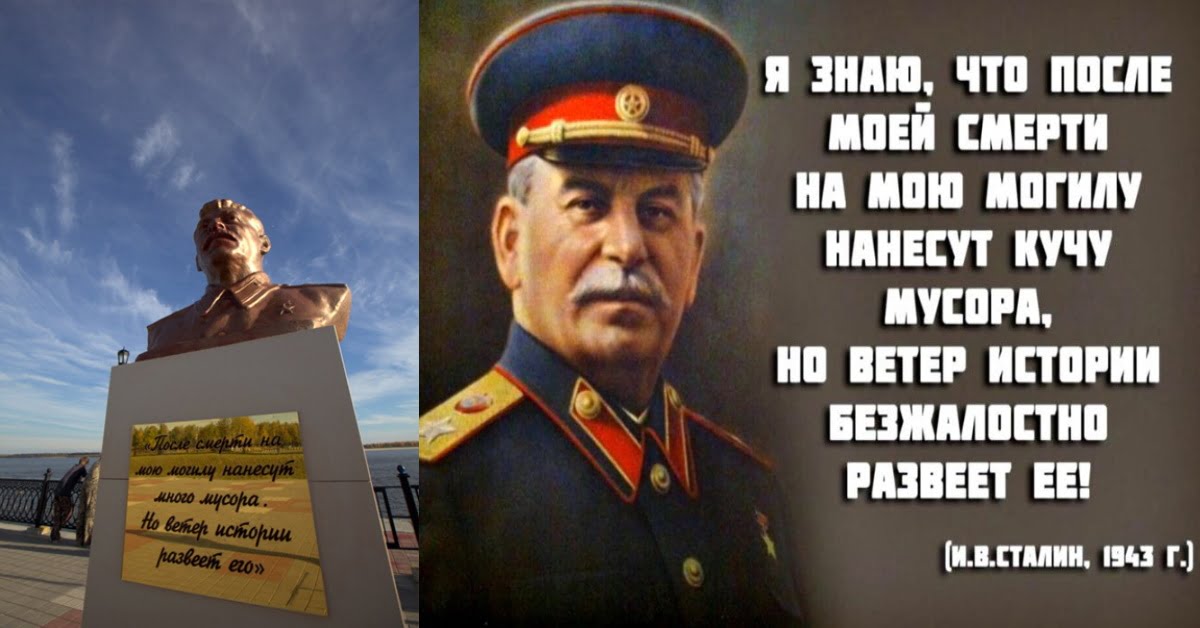On the Internet and printed literature you can often find a quote in which Stalin seems to anticipate a negative attitude towards himself in the future. We checked whether the Soviet leader said it.
Saying decorates one of the walls in the State House-Museum of J.V. Stalin in his hometown of Gori. Several weeks in Surgut in the fall of 2016 stood a monument to Stalin, under which the above quote with minor changes was embossed on a gold tablet. The phrase was also mentioned Novosibirsk Regional Committee of the Communist Party of the Russian Federation, state historical magazine "Motherland", magazine of the Ministry of Internal Affairs of Russia "At the combat post", portal "Stalin.rf", journalist Anatoly Wasserman and MMA fighter Alexander Shlemenko.
The first thing that catches your eye regarding this quote is that it (in different versions) is practically absent from printed sources of Soviet times, but is abundant appears in books from the 90s. For example, in the novel by Alexander Trapeznikov "The Testament of the Red Monarch" (1997), where she is mentioned in the draft of the chief's mythical will. One of the earliest mentions also refers to fiction - in 1989, the American journalist Vladimir Solovyov wrote a novel "Operation Mausoleum", which says: “A few months before his death, he told one of the guards: “When I die, there will be a lot of rubbish on my grave, but time will sweep it all away.”
However, you can find the phrase not only in fiction. In 2004, the memoirs of Marshal Alexander Golovanov were published in full for the first time. "Long-Range Bomber", in which he shares some memories of the leader of the peoples. They contain a slightly different phrase: “I know that when I’m gone, more than one bucket of dirt will be poured on my head. But I am sure that the winds of history will dispel all this” - Stalin speaks personally to the author on December 5 or 6, 1943. At the same time, judging by treatment Golovanov to the top officials of the state shortly before his death in 1975, after the publication of individual chapters of the book in the magazine “October” in 1969–1972, problems arose and the book was slowed down.
In 1991, a book by Felix Chuev was published "One Hundred and Forty Conversations with Molotov", according to which the ex-People's Commissar, either in 1971 or in 1976, told him in a personal conversation: “Stalin himself, I remember, said during the war: “I know that after my death they will put a heap of garbage on my grave. But the wind of history will mercilessly scatter it!”
It would seem that the evidence of two venerable figures of the Soviet era should be enough to recognize the phrase as genuine. However, there are a few things.
1. There is no such quotation in documents relating directly to Stalin (personal archive, letters, recordings of speeches).
2. Both books were published after the deaths of Golovanov and Molotov, that is, neither one nor the other figure had the opportunity to respond to the quotes given. These words are not present in the censored early version of Golovanov’s memoirs.
3. How asserts In his memoirs, Felix Chuev, he himself took an active part in the preparation of Golovanov’s memoirs: “I edited the manuscript, obtained the necessary materials.” Back in Soviet times, the memoirs were collected in a separate book, but it was first published in an abridged form only in 1997.
Let us note that Felix Chuev is not only the author of memoirs about Molotov, but also a Stalinist poet who had a hand in disseminating a number of myths about the leader. In particular, in another chapter "One Hundred and Forty Conversations" Molotov quotes Churchill in the House of Commons from the Encyclopedia Britannica: “Stalin... received Russia with a plow and left it with atomic weapons,” while the British prime minister never said that. Chuev was also noted for disseminating information about false order for the deportation of Ukrainians. Therefore, these two sources cannot be seriously trusted - they come from the same person, who could very well try to elevate his idol in this way.
However, there is a third source. IN Volume 18 the collected works of Stalin, published in 2006, contains his conversation with Alexandra Kollontai, which took place in November 1939. It is quoted from the words of a party activist and contains the following quote from the leader: “Many of the affairs of our party and people will be distorted and spat upon, first of all abroad, and in our country too. Zionism, striving for world domination, will brutally take revenge on us for our successes and achievements. He still views Russia as a barbaric country, as a raw materials appendage. And my name will also be slandered and slandered. Many atrocities will be attributed to me.”
This quote is quite similar in structure to the one we are considering, but there are also several problems here.
1. Alexandra Kollontai, who devoted many years to diplomatic work abroad, actually came to Moscow for two days in November 1939 and even tried to meet with the leader. But she couldn’t, which she directly writes about in her memories (“I never saw Stalin”). Moreover, this meeting is not recorded in any document, including minute-by-minute list of techniques from Stalin.
2. In the collected works of J.V. Stalin it is given link on Kollontai’s memoirs, published in the magazine “Dialogue” in 1998. This magazine has earned a bad reputation for its publications - in particular, fake open letter Marshal Chuikov to the writer Solzhenitsyn.
3. Volumes 14–18 of Stalin’s collected works can be called apocryphal - they were published after the collapse of the USSR on the initiative of Stalinist professor Richard Kosolapov and are remembered for many fictional facts, without checking those extracted from the literature of the 90s. In particular, we have already contacted to the quote “No man, no problem,” invented by the writer Rybakov, but in the collected works inscribed in an allegedly real dialogue.
Thus, today there is not a single serious source of the Soviet era that would cite Stalin’s phrase about the wind of history. The mention of a similar phrase in a fictional novel published abroad in 1989 may indicate that it circulated at the level of an anecdote, with differences in important details (1943 or 1953, to the security guard or Golovanov). At the same time, Felix Chuev, who was directly related to the publication of both of its versions, could have played a decisive role in the dissemination of variations of the phrase.
Most likely not true
Read on the topic:
1. Egor Yakovlev about Stalin's false prophecies
2. Facts versus lies. Stalinists' tales about Kollontai's diary
3. Fake “Stalinist quote”
If you find a spelling or grammatical error, please let us know by highlighting the error text and clicking Ctrl+Enter.







